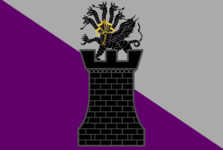Doomstadt
Overview
The Endrani homeland is a place of tension and contradiction, frequently torn asunder by internal conflict. Doomstadt is located in the northwest of Eurus, bordered by Alba's duchy of Warwick on the north, Malay to the south, Helvetia and Shalkara to the east. It is governed by a strict and absolutely monarchy and beneath them a rigid aristocracy composed of exclusively Endrani "Houses," the matriarchs of which function as regional governors in the provinces that House controls. Competition among the houses is fierce and constant, but seldom military.
The land is often barren and forbidding, rich in mineral resources but poor in farmland or trees with one exception, the vast and alien forest of the Griefswald, guarded by ferocious fae and peopled with Trandafir the Griefswald is highly resistant to commercial exploitation. Endrani and Trandafir have a historic vehement hatred for one another that frequently extends beyond Doomstadt to flavor their relations elsewhere.
Culture
The Endrani live under strict Matriarchy. With women vastly outnumbering men and wielding all social power, leadership falls to the Matriarch of the most powerful of the houses. The five largest and most powerful houses (Dramikov, Faustus, Motova, Asten, and Raumi) each hold control over a portion of the country and a district of the capital city of Danzig. Infighting is intense and brutal, with intrigue and assassination being a part of the constant political wrangling of the Houses.
Religions
what faiths are present, what are the views on faith
Social Structure
Doomstadt has a very strict class system dominated by the Endrani Matriarchs. The hierarchy is as follows:
- Queen
- Major House Matriarch
- Minor house Matriarch
- Major House member
- Minor house member
- Unaffiliated Endrani
- Non-Endrani soldiers/incanters
- Non-Endrani general population
- Slaves/former slaves
- Trandafir
Customs and Holidays
What days matter to the people
Arts and Exceptionalism
Politics
Government
Organization of the Land
How the power structure is divided regional (i.e. Duchies, Baronies, Lordships, etc.)
Demographics
The people of Doomstadt are mostly human by a slender majority, with large numbers of goblinoid former slaves amongst the population. Slavery was outlawed in 2005 at the outset of the civil war and abolished completely at the war's conclusion in 2012, meaning that a substantial portion of the underclass are liberated slaves, but the quality of life for the peasantry is not vastly superior to that of enslaved predecessors. Endrani make up about 20% of the population of Doomstadt but enjoy exalted social status there, even if not directly part of the aristocracy. The land of Doomstadt has been ruled and controlled by Endrani for millennia, and they would argue that a low birthrate does not disabuse them of their right to a homeland.
Economy
Foreign Relations
History
History since the Dragon Wars
Early History
National History
Major Modern Events
The current queen, Dolosus Mauvis of house Dramikov, is no exception the constant internal conflicts of her predacessors. A dragoon adoptee of Dramikov, she found herself raised unexpectedly to the crown after a chain reaction of assassinations amongst the Mauvis. Not long after her ascension, the queen was assassinated, only to be reincarnated and reinstated, leading to a civil war that nearly tore Doomstadt apart over the subject of emancipation. The civil war raged from 2005 to 2012, and all but tore Doomstadt apart. It ended only after allies of Queen Dolosus in the north from Alba, notably Duke Sebastian Lledrithcath of Warwick, sapped, burned, and destroyed most of the city of Geissen, destroying most important members of House Dorogai, once one of the most powerful of the big five. It took several years of wrangling for House Asten to eventually emerge on top and claim Dorogai's seat in Danzig as one of the five great houses.
Doomstadt remains locked in problematic struggles to recover from the devastation of the civil war and the economic consequences of abolition. Wealth remains concentrated amongst the Endrani nobility, but without slavery to hold to, the economy is unstable. The nobility remains resistant to efforts to implement social programs or labor protections, but the population breathing a hint of freedom is not keen to tolerate near as much abuse at the hands of their leaders.
Geography
The physical lay of the land

